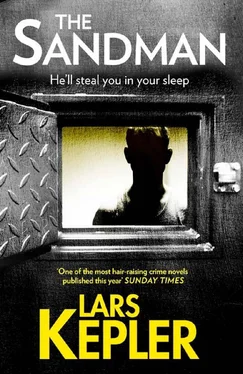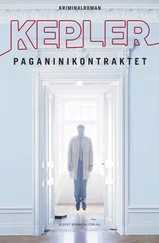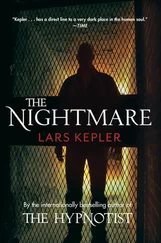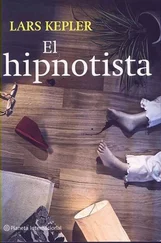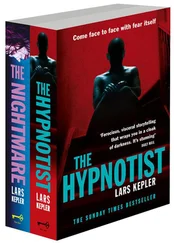‘But that’s crazy,’ Saga whispered.
Sweden had little experience of migrants in those days, and had no effective way of dealing with them. Mistakes were made, and Jurek’s twin brother was sent to Russia as soon as he was well enough. He ended up at Children’s Home 67 in the Kusminki district of south-east Moscow, and was written off as retarded because of the after-effects of his illness. When Jurek, after many years as a soldier, left Chechnya and managed to track down his brother, he had been transferred to a mental hospital, the Serbski Institute, and was a complete wreck.
Saga is so absorbed in her thoughts about the twin brothers that she doesn’t notice Corinne Meilleroux walking towards the security doors at the same time as her. They come close to colliding. Corinne’s hair is tied up and she’s wearing a black trench-coat and high-heeled boots. For once Saga is conscious of the way she’s dressed. Maybe she should have chosen something different from her usual jeans and thick parka.
‘Very impressive,’ Corinne smiles, and gives her a hug.
Saga and Corinne get out of the lift and walk side by side down the corridor leading to their boss’s large office. Nathan Pollock, Carlos Eliasson and Verner Zandén are already waiting for them. On the table is a bottle of Taittinger and five champagne glasses.
The door closes and Saga shakes hands with the three men.
‘Let’s start with a minute’s silence in memory of our colleague Samuel Mendel and his family, and all the other victims,’ Carlos says.
Saga lowers her head and has trouble maintaining a steady gaze. In front of her she can see the first pictures of the police operation in the industrial estate where the old brickworks used to be. Towards morning it had become clear to everyone that no victims were going to be found alive. In the muddy snow the forensics officers had started placing numbered signs by the fourteen different graves. Samuel Mendel’s two sons had been found tied together in a shaft covered by a sheet of corrugated metal. Rebecka’s remains were found buried ten metres away in a drum fitted with a plastic air-tube.
The voices drown in Saga’s tinnitus and she shuts her eyes and tries to understand.
The traumatised twins made their way to Poland, where Roman killed a man, took his passport and became Jurek Walter. Together they caught a ferry from Swinoujscie to Ystad, and then travelled up through Sweden.
Now middle-aged, the brothers returned to the place where they had been separated from their father, to barrack number four in the guest workers’ accommodation at a quarry in Rotebro.
Their father had spent decades trying to trace the boys, but couldn’t travel to Russia himself because he’d be sent to the gulag. He had written hundreds of letters in an effort to find his children, and waited for them to come back, but just one year before the brothers arrived in Sweden the old man gave up and hanged himself in his cellar.
Before Saga left the hospital, Joona had closed his eyes and tried to sit himself up as he explained that finding out about his father’s suicide had wrecked what little was left of Jurek’s soul.
‘He started to draw up his circle of blood and revenge,’ Joona said, almost soundlessly.
Everyone who had contributed to the break-up of his family would experience the same fate. Jurek would take their children from them, their grandchildren and wives, sisters and brothers. The guilty parties would be left as alone as their father in the quarry, they would have to wait year after year, and only when they had killed themselves would those of their relatives that survived be allowed to return.
That was why the twins didn’t kill their victims – it wasn’t the people who were buried who were being punished, but those left behind. During the wait for the suicides, the victims were placed in coffins or drums with air-tubes. Most of them died after just a few days, but some lived for years.
The bodies that were found in Lill-Jan’s Forest and in the vicinity of the Albano industrial estate cast a cruel light on Jurek Walter’s terrible revenge. He was following an entirely logical plan, which was why his actions and the choice of victims didn’t seem to fit the pattern followed by other serial killers.
It was going to take a while for the police to fill in all the details, but it was already apparent who the victims were. Apart from Reidar Frost, who revealed the boys to the foreman in the quarry, they included those responsible at the Child Welfare Commission, and the case-officers at the Aliens Department.
Saga thinks about Jeremy Magnusson, who was a young man when he dealt with the twins’ case at the Aliens Department. Jurek took his wife, son and grandson, then finally his daughter Agneta. When Jeremy eventually hanged himself in his hunting cabin, Jurek went to the grave where Agneta was still being kept alive to let her out.
Saga repeats to herself that Jurek actually had disinterred her, just as he’d told Joona. He had opened the coffin, sat by the graveside and watched her blind fumbling. In this terrible circle, she was a version of him, a child doomed to return to nothing.
Joona explained that Jurek’s brother was so psychologically damaged that he lived among their father’s old possessions in the abandoned barracks. He did everything that Jurek told him to do, learned to handle sedatives and helped him to seize people and watch over the graves. The shelter that their father had built in anticipation of a nuclear war acted as a sort of holding cell before the victims could be placed in graves.
Saga is torn from her thoughts by her boss tapping a glass and asking for silence. With great solemnity he fetches a blue box from the safe, snaps it open and takes out the gold medal.
A wreathed star on a blue-and-yellow ribbon.
Saga’s feels her heart clench unexpectedly when she hears Verner say that she has demonstrated remarkable courage, bravery and intelligence.
The atmosphere in the room is one of gentle solemnity.
Carlos’s eyes are moist, and Nathan smiles at her with a sombre look in his eyes.
Saga takes a step forward and Verner attaches the medal to her chest.
Corinne claps her hands and gives her a big smile. Carlos opens the champagne, firing the cork at the ceiling.
Saga drinks a toast with them, and receives their congratulations. Every so often her hearing is interrupted by a howl of tinnitus.
‘What are you going to do now?’ Pollock asks.
‘I’m on sick leave, but... I don’t know.’
She knows there’s no way she can sit around in her dusty flat with its withered pot-plants, guilt and memories.
‘Saga Bauer, you have done a great deed for your country,’ Verner says, then goes on to explain that unfortunately he’s going to have to keep her medal locked in the safe, seeing as the whole case is confidential and already erased from all public records.
He carefully removes the medal from Saga again, puts it back in its box and closes the safe door securely.
The sun is shining in a hazy sky when Saga emerges from the underground into the swirling snow.
After they arrested Jurek, Samuel Mendel and Joona Linna ended up on his revenge list. His twin brother seized Samuel’s family, and was closing in on Summa and Lumi when they were killed in a car crash.
The only conceivable explanation as to why Mikael and Felicia were kept in the capsule was that Jurek never had time to give his brother any orders about where they were to be buried. Whereas Samuel Mendel’s family was buried, Mikael and Felicia were held captive for all the years that Jurek was in solitary confinement in the secure psychiatric unit. His brother gave them scraps of food and made sure they couldn’t escape while he waited for orders from Jurek, as usual.
Читать дальше
Конец ознакомительного отрывка
Купить книгу
